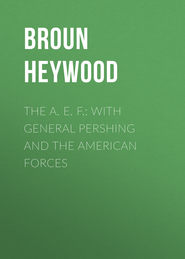По всем вопросам обращайтесь на: info@litportal.ru
(©) 2003-2024.
✖
Pieces of Hate; And Other Enthusiasms
Настройки чтения
Размер шрифта
Высота строк
Поля
"You can find him," said the city editor with confidence. "Just take this picture with you. He's sort of fat and he speaks with an English accent."
We had a more helpful description than that in our mind, because we remembered Chesterton's answer when a sweet girl admirer once remarked, "It must be wonderful to walk along the streets when everybody knows who you are."
"Yes," said Chesterton; "and if they don't know they ask."
He wasn't in the bar, but we found him in the smoking room. He was giving somebody an interview without much enthusiasm. It seemed to be the last round. Chesterton was beginning to droop. Every paradox, we feared, had been hammered out of him. He rose a little wearily and started for the elevator. We chased him. At last we had the satisfaction of finding some one we could outrun. He paused, and now we know the look which the Wedding Guest must have given to the Ancient Mariner.
"It's for the New York Tribune," we said.
"How about next week?" suggested Mr. Chesterton.
"It's a daily newspaper," we remonstrated. "You know – Grantland Rice and The Conning Tower and When a Feller Needs a Friend."
Something in the title of the Briggs series must have touched him. "To-morrow, perhaps," he answered. Feeling that the mountain was about to come through we stood our ground like another Mahomet. Better than that we rose to one of the few superb moments in our life. Looking at Mr. Chesterton coldly we said slowly, "It must be now or never." And we used a gesture. The nature of it escapes us, but it was something appropriate. Later we wondered just what reply would have been possible if he had answered, "Never." After the danger had passed we realized that we had been holding up the visitor with an empty gun. It must have been our manner which awed him and he stopped walking and almost turned around.
"The press men have been here since two o'clock," he complained more in sorrow than in anger. "What is it you want to know?"
At that stage of the interview the advantage passed to him. The whole world lay before us. Dimly we could hear the problems of a great and unhappy universe flapping in our ears and urging us with unintelligible, hoarse caws to present their cases for solution. And still we stood there unable to think of a single thing which we wanted to know.
Mostly we had read Chesterton on rum and religion, but there were too many people passing to give the proper atmosphere for any such confidential questions. Moreover, if he should question us in turn we realized that we would be unable to give him any information as to when to boil and when to skim, nor did we feel sufficiently well disposed to let him in on the name of the drug store where you say "I'm a patient of Dr. Brown's" and are forthwith allowed to buy gin.
All the questions we had ever asked anybody in our life passed rapidly before us. "What do you think of our tall buildings?" "Have you ever thought of playing Hamlet?" "Why are you called the woman with the most beautiful legs in Paris?" We remembered that the last had seemed silly even when we first used it on Mistinguett. On second thought we had told the interpreter to let it drop because the photographers were anxious to begin. There seemed to be even less sense to it now. Indeed none of our familiar inquiries struck us as appropriate.
"What American authors do you read?" we ventured timidly, and added "living ones" hoping to get something about "Main Street" for Wednesday's book column.
"I don't read any," he answered.
That seemed to us a possible handicap in pursuing that line of inquiry.
"I don't read any living English authors, either," Mr. Chesterton added hastily, as if he feared that he had trod upon our patriotism. "Nothing but dead authors and detective stories."
That we had expected. In the march up to the heights of fame there comes a spot close to the summit in which man reads "nothing but detective stories." It is the Antæan touch which distinguishes all Olympians. As you remember, Antæus was the demigod who had to touch the earth every once and so often to preserve his immortality. Probably he did it by reading a good murder story.
"Can you tell me what 'Mary Rose' is all about?" we suggested, still fumbling for a literary theme.
"I haven't seen 'Mary Rose,'" said Mr. Chesterton, although he did go on to tell us that Barrie had done several excellent plays. Probably there was a long pause then while we tried to think up something provocative about the Irish question.
"If you really will excuse me, I must go to my room," he burst out. "The press men have been here ever since two o'clock."
This, of course, is no land in which to stand between a man and his room, where heaven knows what solace may await the distinguished visitor who has been spending two and a half hours with the press men. We stepped aside willingly enough. Still, we must confess a slight disappointment in Gilbert K. Chesterton. He's not as fat as we had heard.
V
ON BEING A GOD
We have found a way to feel very close kin to the high gods. The notion that we too leaned out from the gold bar of heaven came to us suddenly as we sat in the right field bleachers of one of the big theaters which provide a combination bill of vaudeville and motion pictures. The process of deification occurred during the vaudeville portion of the program.
The stage was several miles away. We could see perfectly and hear nothing as it was said. Curious little, insect-like people moved about the stage aimlessly. And yet there was every evidence that they took themselves seriously. You would be surprised if you watched ants conducting a performance and calling for light cues and such things. It would puzzle you to know why one particular ant took care to provide himself with a flood of red and another just as arbitrarily chose green.
Still, these were not ants but potentially men and women. They had names – Kerrigan and Vane, the Kaufman Trio, Miss Minstrel Co. and many others. From where we sat they were insects. It seemed to us that it would be no trouble at all to flip the three strong men and the pony ballet into oblivion with one finger. The little finger would be the most suitable.
And there were times when we wanted to do it. Only, the feeling that we were too new a god to impose a doom restrained us. No divine patience was in us, but we felt that if we could wait a while it might come. The agitated atoms annoyed us. The audacity of "pony ballet" was almost insufferable. Why, as in Gulliver's land, the biggest of the strong men towered above the smallest of the ballet girls by at least the thickness of a fingernail. And these performing ants were forever working to entertain. They ran on and off the stage without apparent reason and waved their antennæ about furiously. Two of the ants would stand close together as if in conversation, and every now and then one of them would hit the other brutally in the face.
We did not know why and our sympathies went entirely to the one who was struck. It was difficult not to interfere. We rather think that some of the seemingly extraordinary judgments of the high gods between mortals must be explained on the ground of a somewhat similar imperfect knowledge. They too see us, but they cannot hear. Time is required for sound to reach Olympus. When we get into warfare they observe only the carnage and the turmoil. The preliminary explanations arrive several years after the peace treaties have been signed, and then they sound silly and entirely irrelevant.
Accordingly, the high gods are rather loath to interfere in the wars of earth. They are too far removed to understand causes, and even trumpet-like shouts about national honor merely amble up to their ears through long lanes of retarding ether. Indeed, the period of transit is so long that national honor invariably arrives at Olympus in poor condition. Only when strictly fresh is it in the least inspiring. Little old last century's national honor is quite unpalatable. It is food neither for gods nor men.
It was just as well that we waited before taking blind vengeance on the vaudeville insects, because half an hour or so after the blows were struck by the seemingly aggressive ant the conversation which preceded the violence began to drift back to us. It came to our ears during the turn of the strong men and created a rather uncanny effect. At first we were puzzled because we had never known strong men to exchange any words at all except the traditional "alleyup." Almost immediately we realized that it was merely the tardiness of sound waves which caused the delay of the dialogue in reaching us in our bleacher seat.
Fortunately, in spite of our illusion of omnipotence, the distance from the stage was not truly Olympian. The jokes came in time to be appreciated. It seems that one of the ants, whom we shall immediately christen A, told his friend and companion, B for convenience, that he was taking two ladies to dinner and that he would like to have B in the party, but that he, A, did not have sufficient funds to defray any expense which he might incur. B admitted promptly that he himself had nothing. Accordingly, A suggested a scheme for sociability's sake. He urged B to come, but impressed upon him that when asked as to what he wished to eat or drink he should reply, "I don't care for anything."
In order to guard against a slip-up the friendly ants rehearsed the scene in advance. It ran something like this:
A – August! August!
B – You're a little wrong on your months. This is January.
A (punching him) – You fool! August is the name of the waiter.
The delay which retarded the progress of this joke to our ears impaired its effectiveness a little. The rest was more sprightly.
A – August, bring some chicken en casserole and combination salad for myself and the two ladies. Oh, I've forgotten my friend. What will you have?
B – Bring me some pigs' knuckles.
At this point A hit B for the second time and again called him a fool.
A – Why did you say, "Bring me some pigs' knuckles?"
B – Why did you ask me so pretty?
Thereupon they rehearsed the situation again.
A – Oh, I've forgotten my friend. Won't you have something? You must join us.
B – Sure, bring me a dish of ham and eggs.
Again blows were struck and again A inquired ferociously as to the cause of the slip-up.
A – What made you say, "Bring me a dish of ham and eggs?"
B – Well, why did you go and coax me?
Earlier in the evening we had observed that other blows were struck and there must have been further dialogue to go with them, but we could not wait for it to arrive. We rather hoped that the jokes would follow us home, but they must have become lost on the way.
Perhaps you don't think there was much sense to this talk anyway.
Maybe the real gods on high Olympus feel the same way about us when our words limp home.









